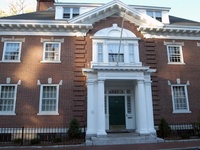And for unrecognized groups—who enjoy none of the benefits of being an officially recognized organization, such as the privilege of using College spaces for group functions—having an independent venue can be crucial to their success.
Delta Gamma recently moved into their new space, giving the chapter a place to hold weekly meetings and their members a place in the Square to gather more informally.
“A lot of the girls who live in the Quad are saying that it’ll be a really good place for them to hang out, do homework, watch TV,” says Caroline T. Quazzo ’12, the president of Delta Gamma.
THE RECOGNITION QUESTION
Official recognition for final clubs, fraternities, and sororities—revoked by the College in 1984 due to the gender-discriminatory recruitment policies of the clubs—is a topic that has been repeatedly discussed, most recently in the election campaign platform of current Undergraduate Council leaders Senan Ebrahim ’12 and Bonnie Cao ’12.
Suzy M. Nelson, dean of student life, says that the gender discrimination issue—as well as sorority and fraternity ties to national organizations—make it unlikely that Greek life will be recognized in the near future.
However, some groups say that the acquisition of an independent space actually negates the need to pursue a relationship with the College.
Once reserving common room spaces or having dorm parties is no longer an issue, club leaders say the recognition may just lead to more unwanted scrutiny from the College administration.
Assistant Dean of Student Life Susan B. Marine said in an interview in February that fraternities have been less involved than sororities in the attempt to establish an official Greek presence on campus, adding that the fraternities—most of which already have established spaces in the Square—may have less reason to seek official relationships with the College.
“Being officially recognized by the university just makes more of a hassle for groups,” says the same president of one male final club.
A PLACE TO PARTY
Given the oft-mentioned dearth of on-campus social options for undergraduates, the most obvious presence of these off-campus options may be their function in Harvard’s party scene.
While students at other colleges rely on off-campus apartments and a thriving bar scene to get their party fix, the Harvard social scene is very different. For many Harvard students looking for a large-scale party free from the oversight of the administration, final clubs and Greek organizations present the only viable option.
“At final clubs you know that there’s always something going on,” says Alexandra P. Berman ’13. “If you’re looking for something to do, and you can’t find any other party, you know there’s always something happening there.”
However, student leaders say that strong interest in off-campus venues should not be viewed as a solution to the lack of a robust campus-centric social scene, and that the administration should continue to work towards fixing the campus social space issue.
Read more in News
Legacy Admit Rate at 30 Percent















